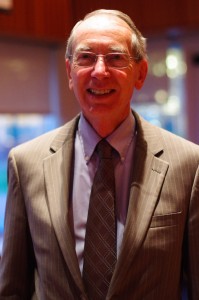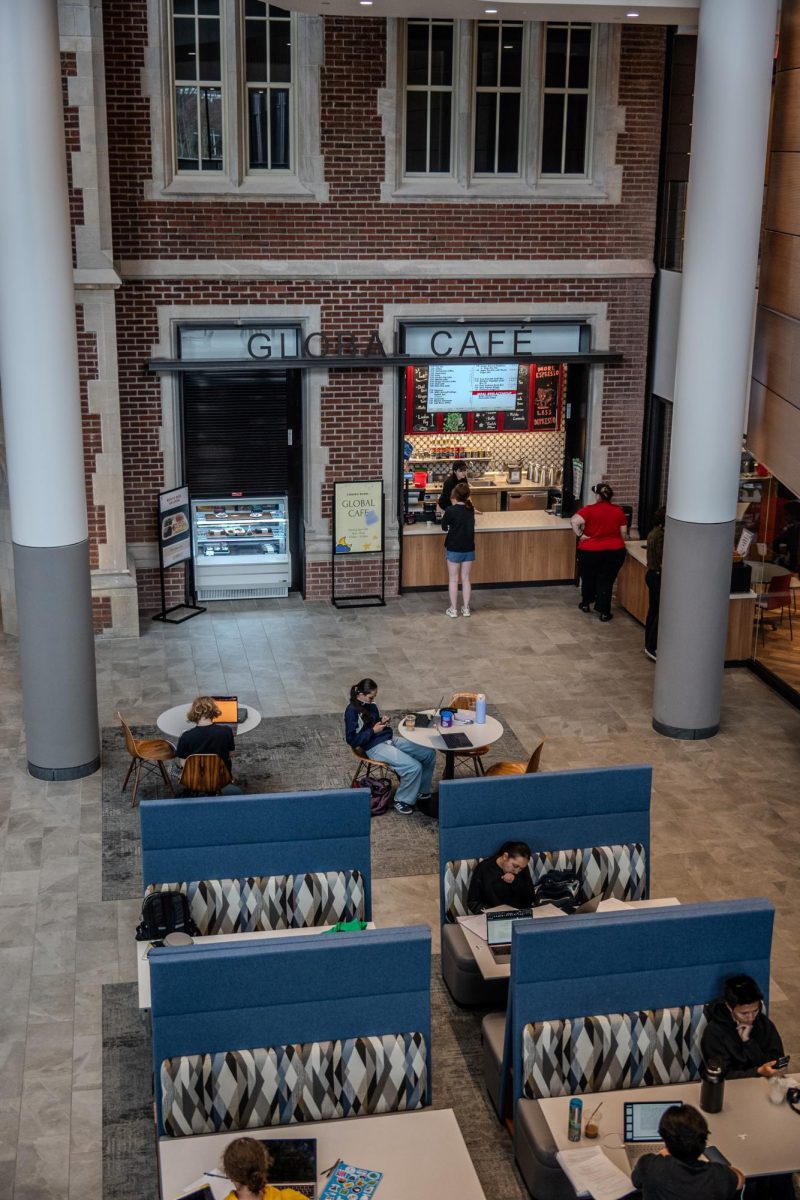Sponsored by Grinnell’s Rosenfield Program, seven speakers were invited to appear on campus as a part of this week’s symposium entitled “Africa’s new role in the International Arena.”
Vice President of Academic Affair Wadzi Motsi ’12, one of the main organizers of the this week’s symposium, was both proud and encouraged about Grinnellians involvement in the symposium.

“It’s a good chance to talk about Africa on campus,” Motsi said. “The symposium has been really well rounded. I think it’s informative for a lot of people. Usually when people talk about Africa they talk about the poverty, the hunger, the sad faces. The symposium has been a lot more well rounded than that.”
Often the conversations surrounding development lean towards talking about the more desperate situations on the continent. Motsi, however, emphasized that the symposium this week brought in many more perspectives and expanded the conversations on campus surrounding Africa.
“African countries are some of the poorest in the world, but there’s also another story of African activists, countries growing economies, all those narratives are coming through,” she said.
On Monday, Lahra Smith, assistant professor in Georgetown’s University’s School of Foreign Service, discussed Africa’s rapid political and economic development. She argued that Africa is currently breaking away from its previous history of economic decline and unstable governmental systems by improving education and health care institutions, as well as through agricultural and industrial development. According to Smith, Africa’s economy is developing more rapidly than any other region in the world.
Kelly Askew, associate professor of anthropology and Afroamerican/African Studies at the University of Michigan, discussed song and poetry that coincided with the death of Tanzania’s first president, Julius Nyerere. Nyerere implemented a socialist economic system, under which he protested subnational divisions, such as ethnic, religious or racial differences. He also promoted liberation movements across Africa. Askew translated and analyzed 150 of the many mourning songs of various genres that were played within the forty days prior to Nyerere’s death. Within them, she found recurring themes of love, peace, unity, God and Nyerere’s wisdom and success but notably absent was any word for “socialism.” Askew continued her research by examining United States journal articles discussing Nyerere’s life and death, and she found that every single one defined him as a “socialist,” typically in a negative context.
Julius E. Coles, former president of Africare, an African-American non-profit organization that provides aid for Africa, spoke at convocation about African political and economic development. During his tenure at Africare the organization size doubled from 30 to 60 million dollars. A graduate of Morehouse College, Coles emphasized that his experiences studying abroad gave him the confidence to pursue his international career and live as a global citizen. Coles sat down with S&B correspondent Charlotte Hechler to discuss his experience working as a global citizen in international development.
What do you think is the role of the United States Federal Government as well as individual grassroots organizations regarding Africa and development?
I think that when you look at development in Africa, it needs all the help that it can get. It’s in dire need of assistance—it’s the poorest area of the world. From my perspective, it needs help from multi-lateral financial institutions like the World Bank and IMF. That assistance needs to be on softer terms than is currently being provided because those organizations have contributed to a very large debt structure that is hampering African countries. Second, I think that government assistance like the United States Agency for International Development or other bi-lateral programs are also important because they bring different skills and values to the table, in terms of helping Africa. But very often, governmental organizations and international financial institutions work at a much larger level—at the governmental level. So NGOs work at the grassroots level, and they are able to get down and work with communities and poorer people. The NGO community has a vast responsibility for working with people at the grassroots level and increasing their capacity. They work in areas where other organizations are not able to work.
On other hand, some governments are becoming very critical of NGOs: they feel that these organizations are not following the government’s strategy for development—that they go off on their own and do their own thing, and that nobody’s there to guide them; that they do whatever they want to do, rather than what the people want to do. So now, there is some attempt in many countries to bring some control to these organizations and not let them work as freely as they have worked in the past. That has both [pros and cons], but I think that in general, we shouldn’t try to put that many restrictions on these types organizations; that they do good work and that they do try to help people in lower levels of income.
One prominent question in Global Development issues is how to provide aid for developing countries to increase the quality of life without imposing upon their culture. What is your opinion on this matter? How can grassroots organizations achieve their goals without replacing traditional culture?
I think the first thing that organizations have to do is listen to what the people say: to communicate with the people. Very often, we as Americans or foreigners go into an environment and we have our own ideas of what needs to be done. And we don’t really try to find out what the people want to have done. Sometimes, there may be conflicts between the aspirations of the donor organizations and the community. But in the longer run, I think it’s best that we try to help [the communities] achieve their goals. And if we can help to influence their ideas of what needs to be done, I think that’s fine but that’s not the highest priority. Our highest priority is to help them to achieve their goals, and to listen to what their goals are. And very often, they have a better idea of what needs be done in their community than the outsider because they know what the environment is like, they know what the shortages are like, they have an understanding of peoples’ health traditions.
The whole issue of cultural sensitivity is very important. Very often, in my own experience in working in development, I’ve felt that it was necessary to employ social scientists (anthropologists and sociologists) to come in and do an analysis of the society and try to understand what some of the problems are, what some of the conflicts are, what the aspirations of the people are. I still think that that has a lot of merit, but we seem to be moving away from that now. So, I think there is a role for social analysis and anthropologists in the development field and they should be more employed by international organizations to have a better understanding of what people see as their own aspirations.
How do you keep hopeful and optimistic in a work where you probably won’t see the extent of the desired changes?
I am very optimistic because I have been working in development work for 50 years of my life. So I saw Africa at the time of independence in the 1960s. I saw Africa at the end of colonialism, and at the beginning of their independent periods. So now, when I go back to Africa, I see Africa from an optic of 50 years. I’ve seen many many positive developments. I’ve seen changes in the educational system, improvements in health, improvements in infrastructure, quality of housing, development and expansion of the middle class. So I don’t look at development in short terms; I look it in much broader terms. And change does not occur over night. It takes time for change to occur. So I don’t have high expectations of change and success in short periods of time. I look at 10 to 20-year periods, and then I can judge. I think we as Americans very often want too much success and instant results. The world does not work that way.
What advice would you give to those Grinnell students who are interested in pursuing a career in Global Development?
Well I think that Grinnell is an excellent environment. I’ve been impressed with the diversity of the student body–the number of international students who are here– the students who come from different countries and speak in different languages. For a small college, I think this is really a unique environment in that regard. I have also had the opportunity to look at the variety of courses offered here, and I think that it provides a good educational background for students to develop the knowledge necessary to be a global citizen, and work in an international environment.
-compiled by Charlotte Hechler





















































